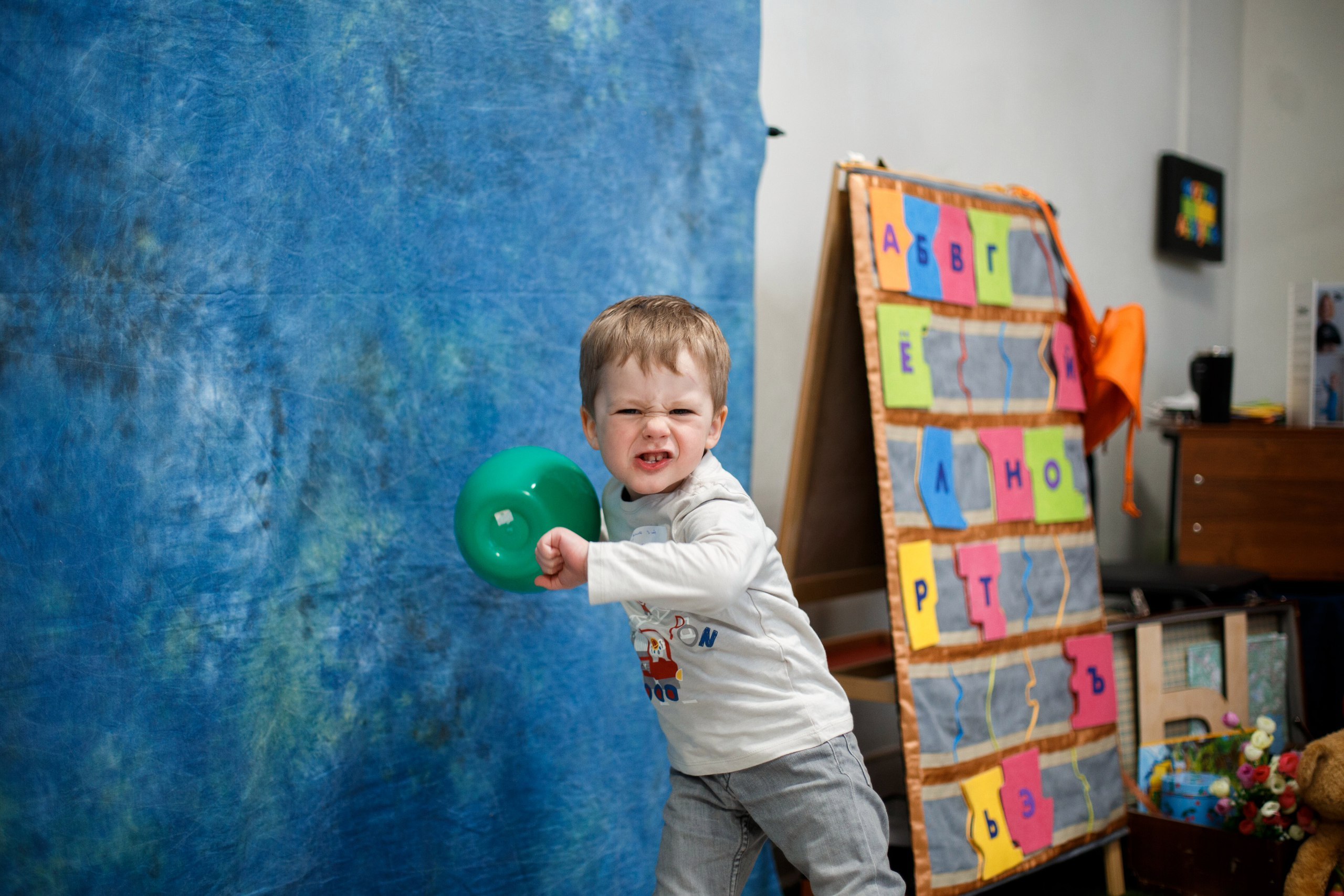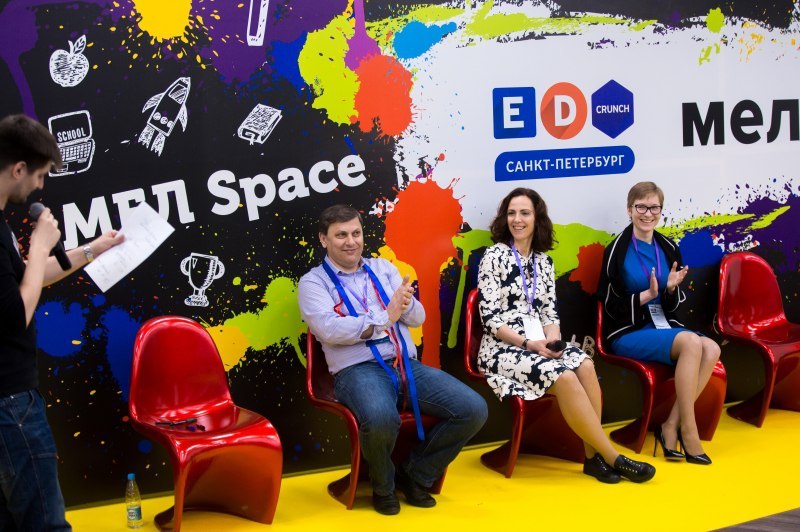Children's education and upbringing as part of the global business process
At the end of April, the EdCrunchSPb forum was held at the ITMO University in St. Petersburg, which until recently did not leave Moscow and MISiS, which this time was addressed primarily to parents and teachers and was devoted to new educational technologies.
For some reason, the topic of children and business is divided and considered as narrow, as if there are no parents among entrepreneurs and top managers and no one is interested. Let us try to change these ideas and give the words of experts who represent the business structures themselves and are themselves interested in the competent upbringing and education of children from elementary school.

Having arrived in St. Petersburg for the first time, the forum brought together about 1,000 guests, as well as authoritative speakers and leading experts in the field of children's education and parenting.
')
Tutta Larsen, TV and radio host, creator of the channel for parents TUTTA.TV and mother of three children

Pavel Luksha, Professor of Skolkovo LNA Practice
Yuliya Sakharova, Head of the North-West HeadHunter:

Dmitry Sudakov, Head of the Atlas of New Professions project, told what will happen to the humanities in the future:
Yulia Selyukova, Director, NP Lift to the Future (AFK Sistema)

Nina Yanykina, Head of Project and Innovation Department, ITMO University
For some reason, the topic of children and business is divided and considered as narrow, as if there are no parents among entrepreneurs and top managers and no one is interested. Let us try to change these ideas and give the words of experts who represent the business structures themselves and are themselves interested in the competent upbringing and education of children from elementary school.

Having arrived in St. Petersburg for the first time, the forum brought together about 1,000 guests, as well as authoritative speakers and leading experts in the field of children's education and parenting.
')
Tutta Larsen, TV and radio host, creator of the channel for parents TUTTA.TV and mother of three children
Finally, people began to come to the point that you need to start with the desire of the child, and not the child for school. My child will go to this school because it is elite or because it is in our yard. But perhaps the child is not suitable for this school. The main criterion is to watch what the child is interested in, what his character is, what abilities. Based on this, you can choose the appropriate school. Also, children should not be overloaded with different sections and circles, which can adversely affect biological development. And if we add to this gadgets, social networks, etc., then the child "fuses take off." It is important for me that my children grow up psychologically healthy people.
At school until grade 9, the main thing is the relationship between adults and children, it is more important than the educational process itself. It should not be a child for school, but a school for a child. Any child from the very early age yearns for knowledge and learns the world, but by the second grade, the school begins to dislike and can repel any desire to learn. Why does the natural craving of man stumble over school? According to the idea, the school should encourage it and create motivation for students so that it does not turn into a routine.

Pavel Luksha, Professor of Skolkovo LNA Practice
The previous signs of success in the form of a gold medal and a red diploma no longer guarantee a bright future and even the present. What works today will stop working tomorrow. What should be able to those who want to be successful in the new future:
• You need to be able to be creative, because it is the creative approaches that distinguish a person from a car. The places where automation takes place is basically routine work. However, it is not a banal creativity, but the ability to invent new things.
• Ability to collaborate and, working in a team, achieve success. Alone in this new field, alas, is not a warrior. Therefore, it is important to develop emotional intelligence.
• The most important skill in the world of super-saturation - the ability to manage their attention and focus.
Yuliya Sakharova, Head of the North-West HeadHunter:
It is necessary to focus not on specific professions, but to think about the directions that will be in demand:
• Everything connected with a person, his development and aging. That is, biotechnology, medicine, pharmaceuticals, genetics.
• Engineering: an increasing number of devices is on the border of the living with the technical.
• Information technologies that now permeate all spheres of human life.
• All sciences located at the intersection of disciplines: neuropsychology, neuromarketing, neuroeconomics, neurobiology, etc.
• The ability to think critically, not to be afraid to express their opinions, to be able to work in a team.
• Basic education ideally should include mathematics, biology, chess, solving non-standard problems. The more mathematics, the easier it is to master almost any profession, the expert believes.

Dmitry Sudakov, Head of the Atlas of New Professions project, told what will happen to the humanities in the future:
I would suggest to abandon the division in general on techies and humanities, this is the legacy of the era of industrial education, and it is irrelevant. From the point of view of competence, “humanitarian” skills will be no less demanded than technical ones, and those who will combine knowledge and skills from different fields will benefit the most.
The ability to think systemically and work with artificial intelligence will be useful in many different areas, as well as an understanding of the historical context and human emotions.
In general, the concept of "profession", I think, is outdated - it implies some kind of fixed set of skills and competencies, and in the world of the future people will assemble and reassemble it as a designer, all the time, mastering something new. And soon, the ability to do this will be appreciated much more than a prestigious diploma.
Yulia Selyukova, Director, NP Lift to the Future (AFK Sistema)
Schoolchildren share knowledge about the subject itself and how this knowledge can be implemented. Students should begin to join the practice with their ideas about the subject as early as possible. Now I see that this is not enough in the school and this gap is taken up by additional education: circles, children's technoparks, the STI Olympiad (the national technological initiative). It is necessary to give the child to try to do something, and not to lecture on how good it is to be a journalist or a programmer. I tell students that the sooner a person goes to practice, an internship, tries to do some real work, the better.
I also want to note that if you want, you do not want it, but a person should have digital literacy. We observed this in shifts at our design schools, when biology girls came, and they had to learn to program on site, and to solder someone. For example, one girl calmed down and stopped crying when she managed to solder and she even liked it.

Nina Yanykina, Head of Project and Innovation Department, ITMO University
We want to be active participants in the process of shaping the right culture and environment for human development from an early age in our country. We want to know and understand how those children will grow up, who in a few years will come to study at the university, will make new scientific discoveries, create their own businesses, become teachers. And we want them to be successful and happy, to create a better world for life today and tomorrow. Our task is to help both them and their parents decide on their life path, the principles by which they will live. In the near future, education will probably not be what it looks like now. Technologies are moving forward, we are seeing the explosive growth of EdTech startups, new forms and learning tools are being created. But the most important thing, in my opinion, is that in the course of the educational process the values of a person are laid, and here we need to work together - for parents and educational organizations.
Source: https://habr.com/ru/post/403811/
All Articles